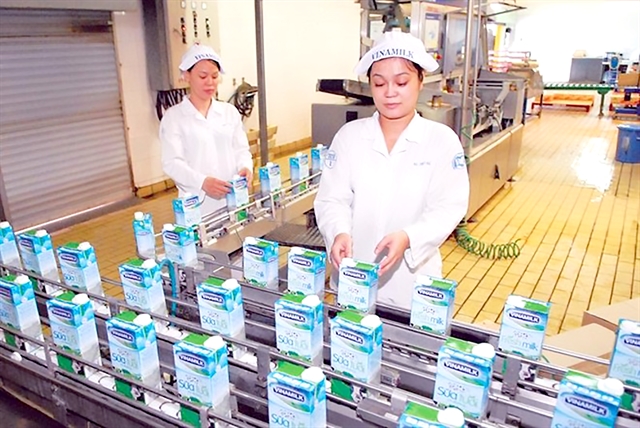Vietnamese shares managed to maintain an upward trend after a volatile afternoon trading session amid large differences in large-cap prices.

Vietnamese shares managed to maintain an upward trend after a volatile afternoon trading session amid large differences in large-cap prices.
On the Hồ Chí Minh Stock Exchange (HoSE), the market benchmark VN-Index gained 0.07 per cent to end Thursday at 1,151.61 points.
It had gained 0.62 per cent to close Wednesday at 1,150.81 points.
The market's breadth was neutral with 242 gainers and 226 losers.
Liquidity decreased compared to the previous session with 647 million shares traded on the southern bourse, worth nearly VNĐ14.4 trillion (US$588 million).
The VN30-Index, tracking the 30 biggest stocks on HoSE, lost 0.15 per cent to end at 1,165.49 points. Thirteen out of 30 stocks in the VN30 basket posted gains, while 13 decreased.
In the VN-30 group, bluechips experienced large variety in prices, with gainers including Sabeco (SAB), PetroVietnam Gas JSC (GAS), Mobile World Group (MWG), Vinamilk (VNM), Vincom Retail (VRE), Vietinbank (CTG), Bảo Việt Holdings (BVH), and Vietjet (VJC).
On the other side, losers were Masan Group (MSN), Vingroup (VIC), Becamex (BCM), FPT Corporation (FPT), Hoà Phát Group (HPG), Mobile World Group (MWG), SSI Securities Inc (SSI), Vietcombank (VCB), Techcombank (TCB), Sacombank (STB) and Military Bank (MBB).
“Although there are cautious and tense developments, in general, the supply at low prices is not strong, reflected in reduced liquidity,” said Việt Dragon Securities Co.
“This movement helped the market regain its upward momentum and continue to challenge the resistance zone at around 1,150 points. Currently, the supply pressure at this resistance zone is cooling down, so it is likely that the market will continue to extend its recovery in the near future.”
However, the recovery will be difficult because supply pressure may increase again when the market approaches a new resistance zone, such as the 1,160 - 1,170 point area. Therefore, investors need to observe and evaluate supply and demand when the market recovers. Temporarily, it is still necessary to consider the market's recovery ability to restructure the portfolio in a way that minimises risks.”
Nine out of 25 sector indices on the stock market posted gains, including construction, real estate, and seafood production.
On the other side, losers were oil and gas, retail, banking, wholesale insurance, securities, IT, agriculture, rubber production, logistics, healthcare, food and beverage, and construction materials.
On the Hà Nội Stock Exchange (HNX), the HNX-Index gained 0.61 per cent to end at 238.44 points. — VNS





